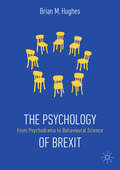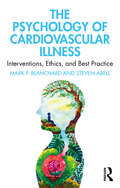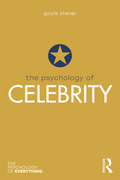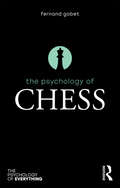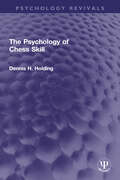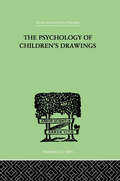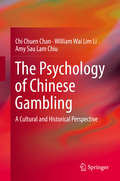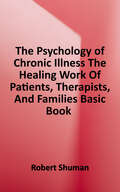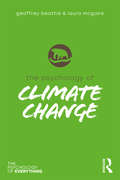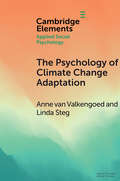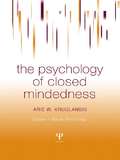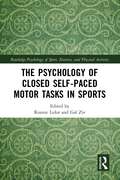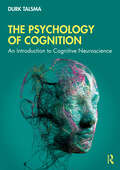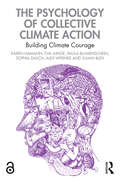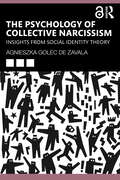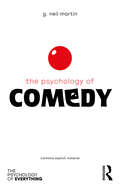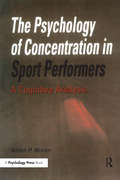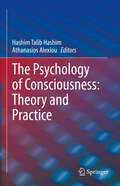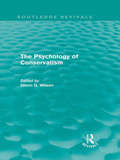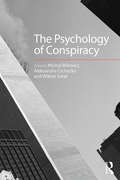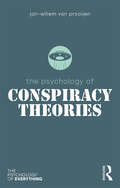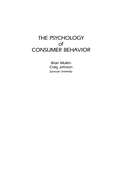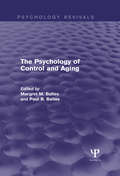- Table View
- List View
The Psychology of Brexit: From Psychodrama to Behavioural Science
by Brian M. HughesThe Psychology of Brexit examines the psychological causes, catalysts, and consequences of Brexit. Unlike most cultural upheavals, Brexit is not the result of accidental tragedy or spontaneous economic turmoil. Rather, it exists because people decided to make it exist. It is a product of human psychology – shaped in critical ways by people’s perceptions, preferences, choices, self-images, attitudes, ideas, assumptions, group relations, and reasoned (or ill-reasoned) conclusions. This book discusses how reasoning biases and illusions of control propel – and pollute – the perspective of both Leavers and Remainers. It shows how social stereotypes and motivated irrationality help otherwise groundless beliefs thrive in everyday culture, leading to group polarisation and echo-chamber reasoning. It reveals the way cultural biases like sexism influence how Brexit politicians are portrayed and perceived. And it explores the psychological impact of Brexit – its effect on social attitudes, future thinking, and collective and individual mental health. In this compelling new book, psychologist Brian Hughes examines what scientific psychology reveals about the dynamics of Brexit, what Brexit teaches us about ourselves, and what we can do to deal with its short-term impact and long-term fallout.
The Psychology of Cardiovascular Illness: Interventions, Ethics, and Best Practice
by Mark P. Blanchard Steven AbellThis important book shows those working with clinical populations how to develop an understanding of the psychology of patients with cardiovascular problems to support appropriate medical care. An understanding of the psychological underpinnings of physical illness can alter the way clinicians conceptualize their patients and the communities they serve. Based on the latest research, this book offers suggestions about how to approach cardiovascular disease holistically in multidisciplinary medical settings with competence and professionalism in mind. With the escalating prevalence of cardiovascular diseases, this book flags the importance of understanding the psychological mechanisms at play in affected patients, highlighting the multifactorial pathways that lead to the development of physical health maladies and comorbid psychopathology. It describes the bidirectional relationship of cardiovascular disease with personality pathology and offers best practices in interacting between primary care, cardiology, psychologists, and other allied professionals. It also provides specific instruction about how to navigate the relationship with medical doctors while illustrating the unique ethical challenges or limitations of the health psychologist working with patients, their families, and providers in clinical practice. Moreover, it includes coverage of treatment plans taking into consideration individual differences in age, health status, and culture. This book will be of interest to anyone interested in furthering their knowledge about the complex interplay between cardiovascular problems and mental health conditions, especially clinical health psychologists who collaborate with social workers, primary care physicians, cardiologists, and surgeons alike.
The Psychology of Celebrity (The Psychology of Everything)
by Gayle SteverWhy are we fascinated by celebrities we’ve never met? What is the difference between fame and celebrity? How has social media enabled a new wave of celebrities? The Psychology of Celebrity explores the origins of celebrity culture, the relationships celebrities have with their fans, how fame can affect celebrities, and what shapes our thinking about celebrities we admire. The book also addresses the way in which the media has been and continues to be an outlet for celebrities, culminating in the role of social media, reality television, and technology in our modern society. Drawing on research featuring real life celebrities from the Kardashians to Michael Jackson, The Psychology of Celebrity shows us that celebrity influence can have both positive and negative outcomes and the impact these can have on our lives.
The Psychology of Chess (The Psychology of Everything)
by Fernand GobetDo you need to be a genius to be good at chess? What does it take to become a Grandmaster? Can computer programmes beat human intuition in gameplay? The Psychology of Chess is an insightful overview of the roles of intelligence, expertise, and human intuition in playing this complex and ancient game. The book explores the idea of ‘practice makes perfect’, alongside accounts of why men perform better than women in international rankings, and why chess has become synonymous with extreme intelligence as well as madness. When artificial intelligence researchers are increasingly studying chess to develop machine learning, The Psychology of Chess shows us how much it has already taught us about the human mind.
The Psychology of Chess Skill (Psychology Revivals)
by Dennis H. HoldingBoth chess play and psychological research offer rewards to their participants in the form of intellectual satisfaction. It seems to follow that combining these two forms of activity, by carrying out research into chess play, should be a particularly engaging enterprise. In the mid-1980s enough was now known for it to be feasible to tell a reasonably satisfying story by piecing together the accumulated results of experiments on chess. There were remaining gaps in knowledge, but the structure of chess skill had at least become sufficiently evident to exhibit where the gaps lay. Originally published in 1985, this book was an attempt to summarize the progress that had been made at the time, recounting some of the components of the research process while describing how the chessplayer seems to think, imagine, and decide.
The Psychology of Children's Drawings: From the First Stroke to the Coloured Drawing (International Library Of Psychology Ser.)
by Eng, HelgaFirst Published in 1999. Routledge is an imprint of Taylor & Francis, an informa company.
The Psychology of Chinese Gambling: A Cultural And Historical Perspective
by Chi Chuen Chan William Wai Lim Li Amy Sau Lam ChiuThis book critically discusses the psychology of Chinese gambling from a cultural perspective. In particular, it investigates the history of gambling, the prevalence of gambling in China, and the personality of Chinese gamblers and explores how the Chinese culture has contributed to the development of gambling and gambling problems. Further, it examines specific evidence-based treatment for Chinese problem gamblers and provides a therapeutic model that is tailored to their needs and psychology. This book useful for students and academics conducting research on Chinese gamblers and the treatments that work for them.
The Psychology of Chronic Illness: The Healing Work of Patients, Therapists, and Families
by Robert ShumanWith the onset of chronic illness, an individual and family’s world, previously taken for granted, is often undone. The actual and potential losses from illness impact family, friends, physicians, therapists, nurses, and others in profound and unexpected ways. Through his own honest, personal account and the testimony of others, Robert Shuman takes us inside the illness experience to help us better grasp the daily inner lives of the ailing person and his or her family. As our aging population lives longer, chronic illness touches more and more of us. Whether as patient or parent, nurse or spouse, colleague or therapist, we need to have greater knowledge and understanding of the intricacies of chronic illness. Robert Shuman maps out the many dimensions of illness and invites the reader to explore its challenging terrain in a way that provides opportunities for self-discovery and reflection. In lyrical prose, he opens up new ways of thinking about the psychology of illness and healing. He suggests, for example, that illness symptoms can have a generative effect on a person’s imaginative and creative possibilities, and that the socially despised events of illness and disability offer new ways of being once sought through the work of religion. Drawing on the fields of behavioral and family medicine, medical anthropology and sociology, moral and bioethical philosophies, and family, existential, cognitive, Jungian, and archetypal psychotherapies, among others, The Psychology of Chronic Illness raises provocative questions for the professional caregiver as well as for those living with illness and disability. This book will help anyone touched by illness, personally or professionally, to support those living with chronic illnesses and disabilities; to cope with multiple impacts on work, relationships, social roles, individual dreams, and disappointments; to listen to and voice suffering and fears, grief and anger, questions of values and moral doubts; and to acknowledge loss and mourning as a “common ground” that we all share. This book offers specific resources to the caregiver and aids the professional in his or her ethical obligation to give. Moreover, Shuman’s voice is one of compassion, reminding us how to hold on to or recover hope, meaning, and morale during times of affliction and distress.
The Psychology of Climate Change (The Psychology of Everything)
by Geoffrey Beattie Laura McGuireWhat explains our attitudes towards the environment? Why do so many climate change initiatives fail? How can we do more to prevent humans damaging the environment? The Psychology of Climate Change explores the evidence for our changing environment, and suggests that there are significant cognitive biases in how we think about, and act on climate change. The authors examine how organisations have attempted to mobilise the public in the fight against climate change, but these initiatives have often failed due to the public’s unwillingness to adapt their behaviour. The book also explores why some people deny climate change altogether, and the influence that these climate change deniers can have on global action to mitigate further damage. By analysing our attitudes to the environment, The Psychology of Climate Change argues that we must think differently about climate change to protect our planet, as a matter of great urgency.
The Psychology of Climate Change Adaptation (Elements in Applied Social Psychology)
by Linda Steg Anne van ValkengoedWhy do some people adapt to the risks of climate change, while others do not? This Element provides an in-depth overview of the psychology of climate change adaptation. It begins with an overview of adaptation behaviour and highlights the importance of successful adaptation by individuals and households. Key psychological theories are introduced that can explain adaptation behaviour and the role of a wide variety of motivational variables in adaptation behaviour is discussed, such as risk perception, experiences with climate-related hazards, and perceived responsibility. Next, the authors examine three examples of how this psychological knowledge has been used to develop and test interventions to promote adaptation behaviour in real-world settings. After which, the relationship between climate adaptation behaviour and climate mitigation behaviour are considered and the potential for integrating these bodies of literature is put forward. It concludes with an agenda for future psychological research on climate change adaptation behaviour.
The Psychology of Closed Mindedness (Essays in Social Psychology)
by Arie W. KruglanskiThe fundamental phenomenon of human closed-mindedness is treated in this volume. Prior psychological treatments of closed-mindedness have typically approached it from a psychodynamic perspective and have viewed it in terms of individual pathology. By contrast, the present approach stresses the epistemic functionality of closed-mindedness and its essential role in judgement and decision-making. Far from being restricted to a select group of individuals suffering from an improper socialization, closed-mindedness is something we all experience on a daily basis. Such mundane situational conditions as time pressure, noise, fatigue, or alcoholic intoxication, for example, are all known to increase the difficulty of information processing, and may contribute to one's experienced need for nonspecific closure. Whether constituting a dimension of stable individual differences, or being engendered situationally - the need for closure, once aroused, is shown to produce the very same consequences. These fundamentally include the tendency to 'seize' on early, closure-affording 'evidence', and to 'freeze' upon it thus becoming impervious to subsequent, potentially important, information. Though such consequences form a part of the individual's personal experience, they have significant implications for interpersonal, group and inter-group phenomena as well. The present volume describes these in detail and grounds them in numerous research findings of theoretical and 'real world' relevance to a wide range of topics including stereotyping, empathy, communication, in-group favouritism and political conservatism. Throughout, a distinction is maintained between the need for a nonspecific closure (i.e., any closure as long as it is firm and definite) and needs for specific closures (i.e., for judgments whose particular contents are desired by an individual).Theory and research discussed in this book should be of interest to upper level undergraduates, graduate students and faculty in social, cognitive, and personality psychology as well as in sociology, political science and business administration.
The Psychology of Closed Self-Paced Motor Tasks in Sports (Routledge Psychology of Sport, Exercise and Physical Activity)
by Ronnie LidorIn practice settings, competitions, and games, athletes are often required to perform an arsenal of motor tasks in dynamic and challenged sporting environments, where they have to respond without having enough time to prepare themselves for the act. However, in many sport activities athletes also perform closed self-paced motor tasks – tasks that take place in a relatively stable and predictable environment, where there is adequate time to prepare for their execution. Among these tasks are free-throw shots in basketball, putting in golf, serving in tennis, and bowling. In these tasks, performers are able to plan their actions in advance. They can activate a plan, a strategy, a protocol, or a procedure – what we term a ritual behavior. Effective rituals are usually achieved with a high degree of consistency. That is, either deliberately or subconsciously they become an integral part of the act itself. The Psychology of Closed Self-Paced Motor Tasks in Sports explores those plans, procedures, protocols, strategies, and techniques that aim at facilitating the performance and learning of closed self-paced motor tasks. Included in the instructional-psychological routines discussed in this book are pre-performance routines, focusing attention, motor imagery, enhanced expectancies, autonomy support, gaze strategies, self-talk, and periodization. The routines discussed in the book are evidence-based. Based on updated reviews of laboratory and field inquiries on the discussed instructional-psychological routines, practical implications are given for those professionals who teach closed self-paced motor tasks, including coaches, instructors, and sport psychology consultants.
The Psychology of Cognition: An Introduction to Cognitive Neuroscience
by Durk TalsmaThis comprehensive, cutting-edge textbook offers a layered approach to the study of cognitive neuroscience and psychology. It embraces multiple exciting and influential theoretical approaches such as embodied cognition and predictive coding, and explaining new topics such as motor cognition, cognitive control, consciousness, and social cognition. Durk Talsma offers foundational knowledge which he expands and enhances with coverage of complex topics, explaining their interrelatedness and presenting them together with classic experiments and approaches in a historic context. Providing broad coverage of world-class international research this richly illustrated textbook covers key topics including: Action control and cognitive control Consciousness and attention Perception Multisensory processing and perception-action integration Motivation and reward processing Emotion and cognition Learning and memory Language processing Reasoning Numerical cognition and categorisation Judgement, decision making, and problem solving Social cognition Applied cognitive psychology With pedagogical features that include highlights of relevant methods and historical notes to spark student interest, this essential text will be invaluable reading for all students of cognitive psychology and cognitive neuroscience.
The Psychology of Collective Climate Action: Building Climate Courage
by Karen Hamann Eva Junge Paula Blumenschein Sophia Dasch Alex Wernke Julian BlehHow do we find the courage to act together against the climate crisis? This book weaves together real-life findings and examples from the socio-ecological movement with psychological research to show how motivation for collective climate action can be built.The book addresses two key questions: how can individuals be motivated to participate in collective climate action, and how can climate groups become resilient and effective? Specifically, it explores how individuals can foster their identification with climate action groups and the belief in their joint efficacy. It touches on a wide range of topics, covering anger, moral considerations, activist burnout, and the perception of protests, as well as general theories of socio-ecological change.This book is for anyone who is seeking the courage to act together and is curious about psychological insights. It will be essential reading for climate and environmental practitioners, climate activists and campaigners, climate change communicators, and anyone involved in socio-ecological change. It will also be of interest to students and researchers in the fields of environmental psychology, climate change, collective action, and political psychology.The Open Access version of this book, available at http://www.taylorfrancis.com, has been made available under a Creative Commons (CC BY) 4.0 license.
The Psychology of Collective Narcissism: Insights from Social Identity Theory
by Agnieszka Golec De ZavalaThe Psychology of Collective Narcissism is a ground-breaking text that presents a new theory of collective narcissism, a belief that exaggerated greatness of one’s own group should be but is not sufficiently appreciated by others. The book presents this concept against the background of social identity theory and research. It explores antecedent as well as social and political consequences of collective narcissism. The author discusses how this burgeoning theory and research can help to elucidate a wide range of psychological dynamics involved in pressing societal issues, such as the declining appeal of democracy, increasing populism, decreasing social solidarity, increasing societal polarization and prejudice, intergroup hostility and political violence, social inequality, and fake news and belief in conspiracy theories. Also referring to societal problems exacerbated by the COVID-19 pandemic, this highly topical work explores socially shared beliefs as risk factors when predicting responses to crises and highlights conditions in which collective narcissism can be expected. The author also reviews research on interventions reducing the link between collective narcissism, prejudice, and retaliatory intergroup hostility focusing on her recent research on mindfulness. This is a valuable read for academics and students in psychology and the social sciences, those interested in societal processes as well as professionals dealing with the impact of collective narcissism. The Open Access version of this book, available at http://www.taylorfrancis.com, has been made available under a Creative Commons Attribution-Non Commercial-No Derivatives (CC-BY-NC-ND) 4.0 license.
The Psychology of Comedy (The Psychology of Everything)
by G Neil MartinWhat makes us laugh? Why is comedy so important? How does comedy affect our behaviour? The Psychology of Comedy provides a unique insight into the role of laughter and humour in our lives. From the mechanics of comedy and what makes a good joke, to the health benefits of laughter, the book delves into different types of comedy, from slapstick to complex puns, and the physiological response it provokes. The dark side of comedy is also considered, confronting the idea that what is funny to some can be offensive to others, making this universal experience also highly subjective. In a time when comedy continues to be one of the most popular and enduring forms of art, The Psychology of Comedy reminds us that laughter really is good for the soul.
The Psychology of Concentration in Sport Performers: A Cognitive Analysis
by Aidan P. MoranFirst published in 1996. Routledge is an imprint of Taylor & Francis, an informa company.
The Psychology of Conflict and Conflict Management in Organizations (Siop Organizational Frontiers Ser.)
by Michele J. Gelfand Carsten K. W. De DreuThis volume in SIOP's Organizational Frontiers Series is a state-of-the-art overview of contemporary conflict research which aims to place conflict research and theory squarely within the realm of industrial and organizational psychology. This volume brings together and integrates classic and contemporary insight in conflict origins, conflict
The Psychology of Consciousness: Theory and Practice
by Athanasios Alexiou Hashim Talib HashimThis book talks about the levels of consciousness and their roles in controlling our life and behaviour. The consciousness has a main role in learning human to behave and to live in all life’s situation and ages. This book clarifies these situations in details and the laws that make this system work properly. It provides many solutions and suggestions to control ourselves and our minds and put them in the right way. This book explains many of our behaviours depending on the psychology and the role of the consciousness in the psychiatry, how to treat diseases and mental disorders and how to improve the mental health as well. This subject is not well discussed and detailed in literature so there is a need to give this topic its role in the psychology and in scientific literature too. This book is targeting the consciousness’ levels and the role of these levels in our life and behaviours, so it divides the roles among them as appropriate and in the right way and then the humans can recognize which part is more important than the other and on what they should focus.
The Psychology of Conservatism (Routledge Revivals)
by Glenn WilsonFirst published in 1973, The Psychology of Conservatism explores attitudes, their measurement, their structure and dynamics, and the personality traits apparently underlying attitude patterns. It examines the link between differing attitudes and discusses characteristic patterns and syndromes. The book focuses on the origins and dynamics of a major factor called "liberalism – conservatism" which is found to account for much of the variance in attitudes amongst different people. Contributors review previous studies relating to personality and attitude before engaging in new studies and proposing their own theories to explain the conservative attitude. The book introduces provocative theoretical ideas and provides a valuable examination of an important psychological and social attitude syndrome. This book will be of interest to researchers in personality and social psychology, sociology and political science and education.
The Psychology of Conspiracy
by Aleksandra Cichocka Michal Bilewicz Wiktor SoralWhy did the third World Trade Center building (WTC7) collapse on September 11th , even though it was not struck by any aircraft? Why did Princess Diana’s "drunk" driver look sober as he climbed into the car minutes before their deadly accident? Could a slender birch tree really have caused the plane crash which killed the President of Poland in 2010? ‘Conspiracy thinking’ – the search for explanations of significant global events in clandestine plots, suppressed knowledge and the secret actions of elite groups – provides simple and logical answers to the social doubts and uncertainties that occur at times of major national and international crises. Contemporary social psychology seeks to explain the human motivation to create, share and receive conspiracy theories, and to shed light on the consequences of these theories for people’s social and political functioning. This important collection, written by leading researchers in the field, is the first to apply quantitative empirical findings to the subject of conspiracy theorizing. The first section of the book explores conspiracy theories in the context of group perception and intergroup relations, paying particular attention to anti-Semitic conspiracy stereotypes. It then goes on to examine the relationship between an individual’s political ideology and the degree to which they engage in ‘conspiracy thinking’. The concluding part of the book considers the explanatory power of conspiracy, focusing on the link between social paranoia and digital media, and highlighting the social, political, and environmental consequences of conspiracy theories. The Psychology of Conspiracy will be of great interest to academics and researchers in social and political psychology, and a valuable resource to those in the fields of social policy, anthropology, political science, and cultural studies.
The Psychology of Conspiracy Theories (The Psychology of Everything)
by Jan-Willem van ProoijenWho believes in conspiracy theories, and why are some people more susceptible to them than others? What are the consequences of such beliefs? Has a conspiracy theory ever turned out to be true? The Psychology of Conspiracy Theories debunks the myth that conspiracy theories are a modern phenomenon, exploring their broad social contexts, from politics to the workplace. The book explains why some people are more susceptible to these beliefs than others and how they are produced by recognizable and predictable psychological processes. Featuring examples such as the 9/11 terrorist attacks and climate change, The Psychology of Conspiracy Theories shows us that while such beliefs are not always irrational and are not a pathological trait, they can be harmful to individuals and society.
The Psychology of Consumer Behavior
by Craig Johnson Brian MullenAfter years of study in the area of consumer behavior, Mullen and Johnson bring together a broad survey of small answers to a big question: "Why do consumers do what they do?" This book provides an expansive, accessible presentation of current psychological theory and research as it illuminates fundamental issues regarding the psychology of consumer behavior. The authors hypothesize that an improved understanding of consumer behavior could be employed to more successfully influence consumers' use of products, goods, and services. At the same time, an improved understanding of consumer behavior might be used to serve as an advocate for consumers in their interactions in the marketplace.
The Psychology of Contemporary Art
by Gregory MinissaleWhile recent studies in neuroscience and psychology have shed light on our sensory and perceptual experiences of art, they have yet to explain how contemporary art downplays perceptual responses and, instead, encourages conceptual thought. 'The Psychology of Contemporary Art' brings together the most important developments in recent scientific research on visual perception and cognition and applies the results of empirical experiments to analyses of contemporary artworks not normally addressed by psychological studies. The author explains, in simple terms, how neuroaesthetics, embodiment, metaphor, conceptual blending, situated cognition and extended mind offer fresh perspectives on specific contemporary artworks - including those of Marina Abramović, Francis Alÿs, Martin Creed, Tracey Emin, Felix Gonzales-Torres, Marcus Harvey, Mona Hatoum, Thomas Hirschorn, Gabriel Orozco, Marc Quinn and Cindy Sherman. This book will appeal to psychologists, cognitive scientists, artists and art historians, as well as those interested in a deeper understanding of contemporary art.
The Psychology of Control and Aging (Psychology Revivals)
by Margret M. Baltes and Paul B. BaltesOriginally published in 1986, the central topic of this book is the analysis and application of control-related beliefs and behaviours for theory and practice in the psychology of aging. The volume was written for two specific interrelated purposes aimed at cross-fertilization between the psychology of control and the field of gerontology. The first purpose was to summarise available research and theory on the psychology of control for researchers and professionals interested in gerontology at the time. The second was to enrich the field of the psychology of control.
